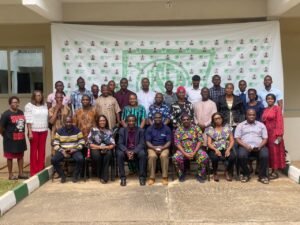
- Agricultural and Food Policy Department:
- Agriculture Production and Value Chain Development
- Rural Development and Extension Services
- Agricultural Technology, ICT, and Innovation
- Gender and Youth Empowerment in Agriculture
- Agricultural Diversification, Agro-Industrial Linkage, and Trade
- Climate-smart agriculture
- Agricultural Finance and Agri-business
- Economic and Business Policy Department
- Real Sector Development and Economic Diversification
- Unemployment, Employment, and Labour Market Dynamics
- Fiscal Policy and Public Debt Management
- Monetary Policy and Price Stability
- External Trade Policies and Competitiveness
- Revenue Diversification and Fiscal Responsibility
- Energy Diversification and Renewable Options
- Industrialization and MSME
- Investment and growth, including FDI and Impact Investment
- Trade and Regional Integration
- Informal sector dynamics (including potential linkages with the formal sector)
- Environmental and Physical Infrastructure Policy Department
- Transport development
- Environment
- Housing
- Renewable Energy
- Population studies
- Climate change and Disaster risks management
- Urban and rural development planning
- Waste management
- Natural Resource Management
- GIS
- Human capital policy Department
- Human resource planning
- Education curriculum development
- Vocational and technical education
- Labour market analysis (including education training and industry mismatches)
- Educational access and quality
- Innovation and Technology Policy Department
- innovation and industrial policy;
- technological innovation;
- science, technology, and innovation
- intellectual property and copyrights issues
- Social Policy Department
- Population & Demographic Issues
- Social related Health issues
- Child & Maternal Health Issues
- Reproductive Health issues
- Gender & Development
- Human Rights Issues
- Criminology
- Poverty Reduction & Social Protection
- Culture & Tourism
- Labour & Industrial Relation.
- Political and Governance Policy Department
- Governance and rule of law
- Political participation and gender inclusion
- Accountability of government and allied institutions
- Security, conflicts, and development
- Public sector & Intergovernmental Relations
- Foreign Relations
- Knowledge Management Department
- Create a national data centre.
- Manage NISER’s knowledge repository to drive productivity in the country
- To create and market NISER brand to local and international audiences
- Research Management Department
- To ensure research quality
- Administration
Strategic Objectives:
- To continuously improve service delivery through improved communication, efficiency, and effectiveness
- Strategically align energies and resources to support the research agenda
- Account and Finance
Strategic Objective:
- To advise the institute’s CEO and guide on all financial matters
- Align financial resources to support NISER’s research agenda
High Limit Gaming Culture: Casinozoid’s Study of Premium Casino Features
The world of premium casino gaming represents a sophisticated ecosystem where exclusivity meets entertainment, creating an environment that extends far beyond traditional gambling experiences. Casinozoid’s comprehensive analysis of high-limit gaming culture reveals intricate layers of luxury service, psychological dynamics, and technological innovation that define this elite market segment. Understanding these premium features provides valuable insights into how the gaming industry caters to its most discerning clientele while maintaining operational excellence.
The Evolution of High-Limit Gaming Environments
High-limit gaming areas have undergone dramatic transformation since their inception in the 1970s, evolving from simple roped-off sections to architectural marvels that rival luxury hotels. The concept originated in Las Vegas when casino operators recognized that certain players required specialized attention and privacy. Early high-limit rooms featured basic amenities: higher betting minimums, dedicated dealers, and complimentary beverages.
Modern premium gaming environments incorporate sophisticated design principles that emphasize comfort, privacy, and exclusivity. Casinozoid’s research indicates that contemporary high-limit areas typically feature soundproofing technology, climate control systems, and ergonomic furniture designed for extended gaming sessions. These spaces often include private dining facilities, dedicated restrooms, and concierge services that operate independently from the main casino floor.
The technological integration within these environments has become increasingly complex. Advanced surveillance systems utilize facial recognition software and behavioral analysis algorithms to enhance security while maintaining discretion. Digital interfaces allow players to customize lighting, temperature, and even music preferences within their gaming areas. Some establishments have introduced biometric access controls and personalized gaming terminals that automatically adjust to individual player preferences.
Architectural firms specializing in casino design now employ environmental psychologists to optimize spatial layouts for high-limit areas. Research demonstrates that certain color schemes, lighting intensities, and spatial arrangements can influence player comfort and engagement levels. These findings have led to the development of gaming environments that subtly encourage longer play sessions while maintaining an atmosphere of luxury and sophistication.
Premium Service Standards and Player Relations
The service ecosystem surrounding high-limit gaming extends far beyond traditional hospitality standards, encompassing personalized financial services, lifestyle management, and relationship building that can span decades. Casinozoid’s analysis reveals that premium player services often begin before guests arrive at the casino, with dedicated hosts managing travel arrangements, accommodation preferences, and gaming credit approvals.
Player development programs for high-limit clientele operate on principles of relationship management rather than transactional interactions. Dedicated hosts undergo extensive training in psychology, cultural sensitivity, and financial discretion. These professionals often maintain relationships with fewer than fifty players, allowing for highly personalized service delivery. The average tenure of successful high-limit hosts exceeds eight years, indicating the importance of long-term relationship building in this sector.
Financial services within premium gaming environments have evolved to accommodate complex banking needs. Many high limit sites now offer on-site banking facilities, foreign currency exchange, and wire transfer services. Some establishments maintain relationships with private banking institutions to facilitate large transactions and provide credit verification services. These financial accommodations reflect the global nature of high-limit gaming, where players may arrive from different countries with varying banking requirements.
The psychological aspects of premium service delivery involve understanding player motivations beyond financial gain. Research indicates that many high-limit players value recognition, exclusivity, and social status as much as potential winnings. Service protocols therefore emphasize discretion, respect, and acknowledgment of player preferences. Staff training includes modules on reading non-verbal communication, managing stress situations, and maintaining professional boundaries while building rapport.
Technology integration in player relations includes sophisticated customer relationship management systems that track preferences, playing patterns, and service requests across multiple visits. These systems enable seamless service delivery regardless of which staff members are on duty, ensuring consistency in the player experience. Some advanced systems utilize predictive analytics to anticipate player needs and proactively arrange services.
Economic Impact and Market Dynamics
The economic influence of high-limit gaming extends throughout the broader hospitality and entertainment industries, generating revenue streams that support employment, tourism, and local business development. Casinozoid’s economic analysis demonstrates that premium gaming segments typically generate disproportionate revenue relative to floor space occupied, with some high-limit areas producing revenue per square foot that exceeds general gaming areas by factors of ten or more.
Market segmentation within premium gaming reveals distinct player categories with varying economic impacts. Ultra-high-net-worth individuals represent the smallest population segment but generate the highest individual revenue contributions. This group often travels internationally for gaming experiences, contributing to tourism revenue, luxury retail sales, and high-end dining establishments. Their economic impact extends beyond direct gaming expenditures to encompass entire vacation experiences.
The employment structure supporting high-limit gaming operations requires specialized skill sets that command premium compensation. Dealers certified for high-limit games undergo additional training and background screening processes. Support staff, including security personnel, hosts, and technical specialists, typically receive salaries significantly above industry standards. This employment premium reflects both the specialized nature of the work and the discretion required when serving high-profile clientele.
Regional economic development often benefits from high-limit gaming facilities through increased tax revenue and tourism attraction. Jurisdictions with favorable gaming regulations and taxation structures have successfully attracted international high-limit players, generating substantial economic activity. The competition between gaming jurisdictions has led to regulatory innovations and tax incentive programs designed to attract premium gaming operations.
Market research indicates that the global high-limit gaming market continues expanding, driven by increasing wealth concentration in emerging markets and growing acceptance of gaming as entertainment among affluent demographics. This expansion has prompted established gaming destinations to invest heavily in premium facility upgrades and service enhancements to maintain competitive positioning.
Technological Innovation and Future Trends
The integration of advanced technology within premium gaming environments represents a convergence of entertainment, security, and personalization that continues reshaping player experiences. Casinozoid’s technology assessment reveals that artificial intelligence applications now extend beyond basic player tracking to encompass predictive modeling, personalized game recommendations, and automated service delivery systems.
Blockchain technology has begun influencing high-limit gaming through enhanced transaction security and transparent gaming outcomes. Some premium establishments have implemented blockchain-based systems for large financial transactions, providing players with immutable records of their gaming activity. These systems also facilitate faster international money transfers and reduce transaction costs for players operating across multiple currencies.
Virtual and augmented reality technologies are being tested in premium gaming environments to create immersive experiences that blend physical and digital elements. Early implementations include virtual dealers for private gaming sessions and augmented reality displays that provide real-time game statistics and historical data. These technologies appeal particularly to younger high-net-worth individuals who expect sophisticated digital integration in luxury experiences.
Biometric technology applications extend beyond access control to encompass player verification, fraud prevention, and personalized service delivery. Advanced systems can identify players upon entry and automatically configure gaming terminals, lighting, and environmental settings to individual preferences. These systems also enhance security by detecting unusual behavioral patterns that might indicate problem gambling or external coercion.
The future trajectory of premium gaming technology points toward increased automation balanced with enhanced human interaction. Predictive analytics will enable more sophisticated player relationship management, while automated systems will handle routine transactions and environmental adjustments. However, the premium nature of high-limit gaming ensures that human service elements will remain central to the experience, with technology serving to enhance rather than replace personal interaction.
Casinozoid’s comprehensive examination of high-limit gaming culture illuminates a sophisticated industry segment that continues evolving through technological innovation, service excellence, and economic adaptation. The premium gaming environment represents more than elevated stakes; it embodies a complete ecosystem designed to serve the unique needs of discerning clientele while generating substantial economic value. As this sector continues developing, the balance between tradition and innovation will likely determine which establishments successfully maintain their position in this competitive and lucrative market segment.
How can we help you?
Contact us at the NISER office nearest to you or submit an inquiry online.



